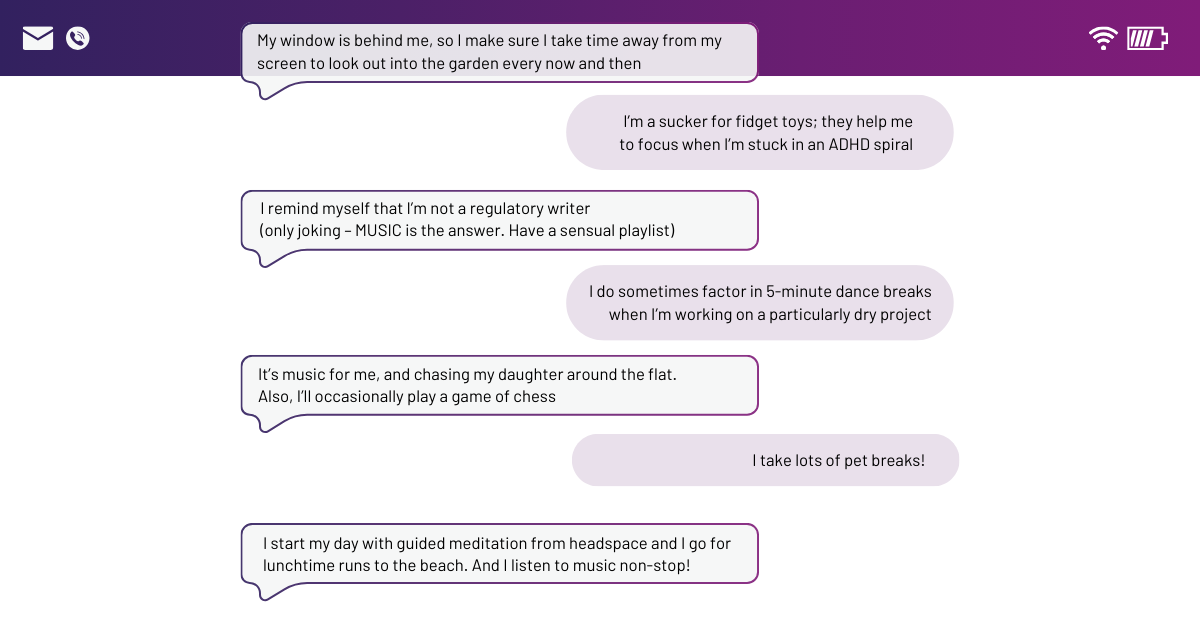The impact and experience of the COVID-19 pandemic shone a spotlight on mental health and how important our mental wellbeing is, especially during times of turmoil.
Mental health problems exist in our lives, families, workplaces, and communities — indeed, mental health issues do not discriminate.
Here at Word Monster, we live a life-first culture, and — you guessed it — this philosophy extends to our mental wellbeing. So, how can you too promote mental wellbeing in your workplace? I’m glad you asked.
Be open to discussing mental health
Being open can be difficult, unless you’re a chronic over-sharer like me… Your employees and colleagues are all different. Those struggling with their mental wellbeing may find it difficult to be open, especially in the workplace. This can be due to fear of embarrassment, judgement, or critique. So how do we overcome this?
Let’s normalise talking about the ‘hard stuff’. Just as we are comfortable talking about the time we broke our arm, or catching another cold from your children’s nursery, let’s make talking about mental wellbeing the norm. Hey, if Ryan Reynolds can broadcast his own colonoscopy to spread awareness about colorectal cancer, we can be open about our mental wellbeing!
By sharing our own experiences, we can spread understanding and awareness of mental wellbeing throughout the workplace. You never know, your story may help your colleague feel seen, heard, and understood. Stigma? She doesn’t even go here!
Support each other’s mental wellbeing
Establishing support networks can be hugely beneficial to your mental wellbeing, especially in the workplace. Family and friends are often who we think of as our main support network, but what about work colleagues? What about your line manager?
‘How unprofessional,’ I hear you gasp!
Poor mental health is one of the main reasons for sickness absence in the UK, with 89% of employees stating that mental health issues impact their work. That said, 70% of managers believe there are barriers to providing mental wellbeing support in the workplace, with only 38% of line managers equipped to have sensitive conversations around mental health.
At Word Monster, we believe the notion that you should ‘leave your problems at the door’ is outdated. To overcome this, we have invested in training members of our team as Mental Health First Aiders to provide support and foster openness in the workplace.
During times of stress or difficulty, whether it be life- or work-related, finding support within the workplace can promote mental wellbeing and productivity. It’s a win-win!
Check in on your own mental health
Overwhelmed by your workload? Is your work-life balance suffering?
We can be so focused on our work that we are not as motivated to give ourselves the same attention. So, check in, not just with others but with yourself. Sometimes, we must be ‘selfish’ to help ourselves and improve our mental wellbeing — and that’s OK! It is important to check in with yourself daily and take time out of your day to do something that brings you joy. How many times has a work colleague asked, ‘how are you?’ and you have the same response: ‘I’m fine’? Be honest, if not with them then with yourself. It’s okay not to be okay.
Here are some things our monsters said perk up their workday:

Promote active change towards your company’s wellbeing
Promoting mental wellbeing starts with us. Those of us who have experienced ‘wobbles’ in our mental wellbeing or know of someone who has struggled should have their voices heard. If we want people to stand with us, we must stand for ourselves.
Ask yourself, ‘how can I promote mental wellbeing in my workplace?’ Find your own way of promoting mental health awareness. It could be through sharing your own experiences, campaigning and fundraising, being approachable to those who need support or even starting a conversation on the importance of mental wellbeing. A huge amount of time, energy and focus is put towards work every day.
At Word Monster, we have developed internal initiatives from ‘Wellbeing Wednesday’ sessions to quarterly wellbeing vouchers to support the wellbeing of our team. We champion flexibility by promoting flexible, remote working because the mental wellbeing of our monsters is fundamental. We are the change.
Conclusion
It’s critical that we take mental wellbeing seriously, as safely reflected in data. Let us remember the gravity of mental wellbeing — not just in the workplace — but globally. In the UK alone, 6,248 people lost their lives to suicide in 2020.
But this is where you can step in. Taking these four steps into account can greatly impact productivity, wellbeing in the workplace, and general mental health improvements for your team.
Be open, be supportive, check in and be the change that your colleagues and employees’ mental health needs. And that, folks, is how you value mental health in the workplace.
References
- Mental Health Foundation. World Mental Health Day. 2022. Available at: https://www.mentalhealth.org.uk/our-work/public-engagement/world-mental-health-day. Accessed February 2024.
- The Female Scientist. The Importance of Mental Health in STEM. 2018. Available at: https://thefemalescientist.com/guide/megan-sharrock-1/1989/the-importance-of-mental-health-awareness-in-stem/. Accessed February 2024.
- Mental Health America. The Mental Health Benefits of Remote and Flexible Work. 2022. Available at: https://mhanational.org/blog/mental-health-benefits-remote-and-flexible-work. Accessed February 2024.
- Mental Health Foundation. Suicide: statistics. 2020. Available at: https://www.mentalhealth.org.uk/explore-mental-health/mental-health-statistics/suicide-statistics. Accessed February 2024.
- Spill. 53 workplace mental health statistics you can’t ignore in 2024. Available at: https://www.spill.chat/mental-health-statistics/workplace-mental-health-statistics#section-2. Accessed February 2024.
